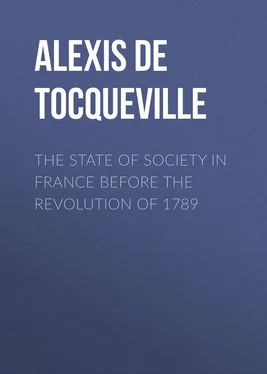Alexis de Tocqueville - The State of Society in France Before the Revolution of 1789
Здесь есть возможность читать онлайн «Alexis de Tocqueville - The State of Society in France Before the Revolution of 1789» — ознакомительный отрывок электронной книги совершенно бесплатно, а после прочтения отрывка купить полную версию. В некоторых случаях можно слушать аудио, скачать через торрент в формате fb2 и присутствует краткое содержание. Жанр: foreign_prose, История, foreign_edu, foreign_antique, на английском языке. Описание произведения, (предисловие) а так же отзывы посетителей доступны на портале библиотеки ЛибКат.
- Название:The State of Society in France Before the Revolution of 1789
- Автор:
- Жанр:
- Год:неизвестен
- ISBN:нет данных
- Рейтинг книги:3 / 5. Голосов: 1
-
Избранное:Добавить в избранное
- Отзывы:
-
Ваша оценка:
- 60
- 1
- 2
- 3
- 4
- 5
The State of Society in France Before the Revolution of 1789: краткое содержание, описание и аннотация
Предлагаем к чтению аннотацию, описание, краткое содержание или предисловие (зависит от того, что написал сам автор книги «The State of Society in France Before the Revolution of 1789»). Если вы не нашли необходимую информацию о книге — напишите в комментариях, мы постараемся отыскать её.
The State of Society in France Before the Revolution of 1789 — читать онлайн ознакомительный отрывок
Ниже представлен текст книги, разбитый по страницам. Система сохранения места последней прочитанной страницы, позволяет с удобством читать онлайн бесплатно книгу «The State of Society in France Before the Revolution of 1789», без необходимости каждый раз заново искать на чём Вы остановились. Поставьте закладку, и сможете в любой момент перейти на страницу, на которой закончили чтение.
Интервал:
Закладка:
The French Government having thus assumed the place of Providence, it was natural that every one should invoke its aid in his individual necessities. Accordingly we find an immense number of petitions which, while affecting to relate to the public interest, really concern only small individual interests. 32 32 See Note XXVII., Bureaux de Tabac.
The boxes containing them are perhaps the only place in which all the classes composing that society of France, which has long ceased to exist, are still mingled. It is a melancholy task to read them: we find peasants praying to be indemnified for the loss of their cattle or their horses; wealthy landowners asking for assistance in rendering their estates more productive; manufacturers soliciting from the Intendant privileges by which they may be protected from a troublesome competition, and very frequently confiding the embarrassed state of their affairs to him, and begging him to obtain for them relief or a loan from the Comptroller-General. It appears that some fund was set apart for this purpose.
Even the nobles were often very importunate solicitants; the only mark of their condition is the lofty tone in which they begged. The tax of twentieths was to many of them the principal link in the chain of their dependence. 33 33 Burke’s speech on the Army estimates, 1790.
Their quota of this tax was fixed every year by the Council upon the report of the Intendant, and to him they addressed themselves in order to obtain delays and remissions. I have read a host of petitions of this nature made by nobles, nearly all men of title, and often of very high rank, in consideration, as they stated, of the insufficiency of their revenues, or the disordered state of their affairs. The nobles usually addressed the Intendant as ‘Monsieur;’ but I have observed that, under these circumstances, they invariably called him ‘Monseigneur,’ as was usually done by men of the middle class. Sometimes pride and poverty were drolly mixed in these petitions. One of the nobles wrote to the Intendant: ‘Your feeling heart will never consent to see the father of a family of my rank strictly taxed by twentieths like a father of the lower classes.’ At the periods of scarcity, which were so frequent during the eighteenth century, the whole population of each district looked to the Intendant, and appeared to expect to be fed by him alone. It is true that every man already blamed the Government for all his sufferings. The most inevitable privations were ascribed to it, and even the inclemency of the seasons was made a subject of reproach to it.
We need not be astonished at the marvellous facility with which centralisation was re-established in France at the beginning of this century. 34 34 See Note XXVIII., Extinction of Loyal Activity.
The men of 1789 had overthrown the edifice, but its foundations remained deep in the very minds of the destroyers, and on these foundations it was easy to build it up anew, and to make it more stable than it had ever been before.
CHAPTER VII
The political preponderance of capital cities over the rest of the empire is caused neither by their situation, their size, nor their wealth, but by the nature of the government. London, which contains the population of a kingdom, has never hitherto exercised a sovereign influence over the destinies of Great Britain. No citizen of the United States ever imagined that the inhabitants of New York could decide the fate of the American Union. Nay more, no one even in the State of New York conceives that the will of that city alone could direct the affairs of the nation. Yet New York at this moment numbers as many inhabitants as Paris contained when the Revolution broke out.
At the time of the wars of religion in France Paris was thickly peopled in proportion to the rest of the kingdom as in 1789. Nevertheless, at that time it had no decisive power. At the time of the Fronde Paris was still no more than the largest city in France. In 1789 it was already France itself.
As early as 1740 Montesquieu wrote to one of his friends, ‘Nothing is left in France but Paris and the distant provinces, because Paris has not yet had time to devour them.’ In 1750 the Marquis de Mirabeau, a fanciful but sometimes deep thinker, said, in speaking of Paris without naming it: ‘Capital cities are necessary; but if the head grows too large, the body becomes apoplectic and the whole perishes. What then will be the result, if by giving over the provinces to a sort of direct dependence, and considering their inhabitants only as subjects of the Crown of an inferior order, to whom no means of consideration are left and no career for ambition is open, every man possessing any talent is drawn towards the capital!’ He called this a kind of silent revolution which must deprive the provinces of all their men of rank, business, and talent.
The reader who has followed the preceding chapters attentively already knows the causes of this phenomenon; it would be a needless tax on his patience to enumerate them afresh in this place.
This revolution did not altogether escape the attention of the Government, but chiefly by its physical effect on the growth of the city. The Government saw the daily extension of Paris and was afraid that it would become difficult to administer so large a city properly. A great number of ordinances issued by the Kings of France, chiefly during the seventeenth and eighteenth centuries, were destined to put a stop to the growth of the capital. These sovereigns were concentrating the whole public life of France more and more in Paris or at its gates, and yet they wanted Paris to remain a small city. The erection of new houses was forbidden, or else commands were issued that they should be built in the most costly manner and in unattractive situations which were fixed upon beforehand. Every one of these ordinances, it is true, declares, that in spite of all preceding edicts Paris had continued to spread. Six times during the course of his reign did Louis XIV., in the height of his power, in vain attempt to check the increase of Paris; the city grew continually in spite of all edicts. Its political and social preponderance increased even faster than its walls, not so much owing to what took place within them as to the events passing without.
During this period all local liberties gradually became extinct, the symptoms of independent vitality disappeared. The distinctive features of the various provinces became confused, and the last traces of the ancient public life were effaced. Not that the nation was falling into a state of languor; on the contrary, activity everywhere prevailed; but the motive principle was no longer anywhere but in Paris. I will cite but one example of this from amongst a thousand. In the reports made to the Minister on the condition of the bookselling trade, I find that in the sixteenth century and at the beginning of the seventeenth, many considerable printing offices existed in provincial towns which are now without printers, or where the printers are without work. Yet there can be no doubt that many more literary productions of all kinds were published at the end of the eighteenth century than during the sixteenth; but all mental activity now emanated from the centre alone; Paris had totally absorbed the provinces. At the time when the French Revolution broke out, this first revolution was fully accomplished.
The celebrated traveller Arthur Young left Paris soon after the meeting of the States-General, and a few days before the taking of the Bastille; the contrast between that which he had just seen in the city and that which he found beyond its walls filled him with surprise. In Paris all was noise and activity; every hour produced a fresh political pamphlet; as many as ninety-two were published in a week. ‘Never,’ said he, ‘did I see such activity in publishing, even in London.’ Out of Paris all seemed inert and silent; few pamphlets and no newspapers were printed. Nevertheless, the provinces were agitated and ready for action, but motionless; if the inhabitants assembled from time to time, it was in order to hear the news which they expected from Paris. In every town Young asked the inhabitants what they intended to do? ‘The answer,’ he says, ‘was always the same: “Ours is but a provincial town; we must wait to see what will be done at Paris.” These people,’ he adds, ‘do not even venture to have an opinion until they know what is thought at Paris.’
Читать дальшеИнтервал:
Закладка:
Похожие книги на «The State of Society in France Before the Revolution of 1789»
Представляем Вашему вниманию похожие книги на «The State of Society in France Before the Revolution of 1789» списком для выбора. Мы отобрали схожую по названию и смыслу литературу в надежде предоставить читателям больше вариантов отыскать новые, интересные, ещё непрочитанные произведения.
Обсуждение, отзывы о книге «The State of Society in France Before the Revolution of 1789» и просто собственные мнения читателей. Оставьте ваши комментарии, напишите, что Вы думаете о произведении, его смысле или главных героях. Укажите что конкретно понравилось, а что нет, и почему Вы так считаете.












